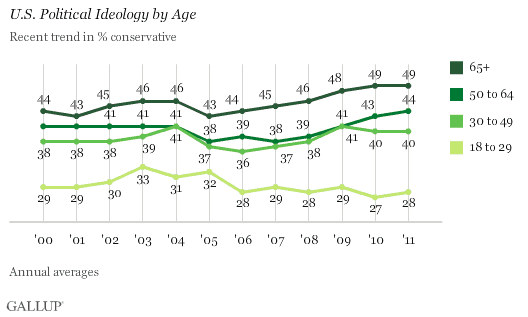So what do you think should happen in order for the D's to regain power? What is this something?
I honestly can't say for sure. I think that if the party had a more unified message focused on economic issues and political corruption it might have more success in rural areas, but I don't know for certain if that will work. Rural areas are important because it isn't possible for Democrats to win back the House without winning at least some rural votes. Right now they get slaughtered. For some reason, the Democrats were able to win those areas from 2006-2008. Perhaps that success was just a reflection of the disastrous Bush administration, and 2010 represented a return to a norm of Republican dominance. I don't know.
I suspect the problem is more fundamental than just focusing on what the leadership of the Democratic party does or doesn't do. Fundamentally, Republican voters are more likely to organize themselves outside of the structure of the Republican party in organizations like churches, gun clubs, and even business groups like ALEC. Really, characterizing these individuals as Republicans is a little misleading: They are Conservatives first, Republicans second. However, they work exclusively through the Republican party, so their success ends up being Republican success.
The ideological nature of the base Republican voter, which is somewhat unique historically in American politics, presents difficulties for Republican's at the Presidential level because it prevents outreach to more moderate voters. However, the Republican's have an advantage in elections with less visibility, such as midterms, because their ideological base is more willing and organized to vote, especially in rural areas. People go to church every Sunday. They meet and network through organizations like the local Chamber of Commerce or the local shooting range. Through those organizing forces, Republicans are able to turn out a reliable base of voters. That is how Republicans win in elections where the turnout is 40 percent and below.
Democrats used to have unions as an organizing force, and they still do, albeit in a weakened form, in States where they do the best. They don't really have anything to counter Republicans in rural areas or states where unions either are withered or non-existent. Advocacy groups like environmental organizations or gun control advocates provide some organizing muscle for Democrats, but they don't seem to have the sustained power that the Republican grass roots organizations do, especially conservative churches and business lobbying groups.
Politics didn't used to work this way. For much of American history, the national political parties were ideologically diverse coalitions from different regions of the country. Teddy Roosevelt was a Republican, and he was a progressive. Franklin Roosevelt was a Democrat, but he completed Teddy's legacy. There were conservative Democrats from the South, and there were liberal Republicans from the North.
Now, though, the Republicans represent a narrow ideologically driven base that turns out no matter what, especially in rural areas. I suspect that, until Democrats develop a counter in rural areas, they will continue to encounter difficulties outside of national and statewide elections, especially when those elections are not held in Presidential years.
My fear is that the Presidency is a rather thin reed to grasp onto for preventing the government from falling completely under the control of the Paul Ryans of the world. You would have thought that the Republicans were guaranteed dominance for a generation after 68, but somehow Carter snuck in there in between consecutive Republican blowouts at the Presidential level. Shit has a way of happening.




